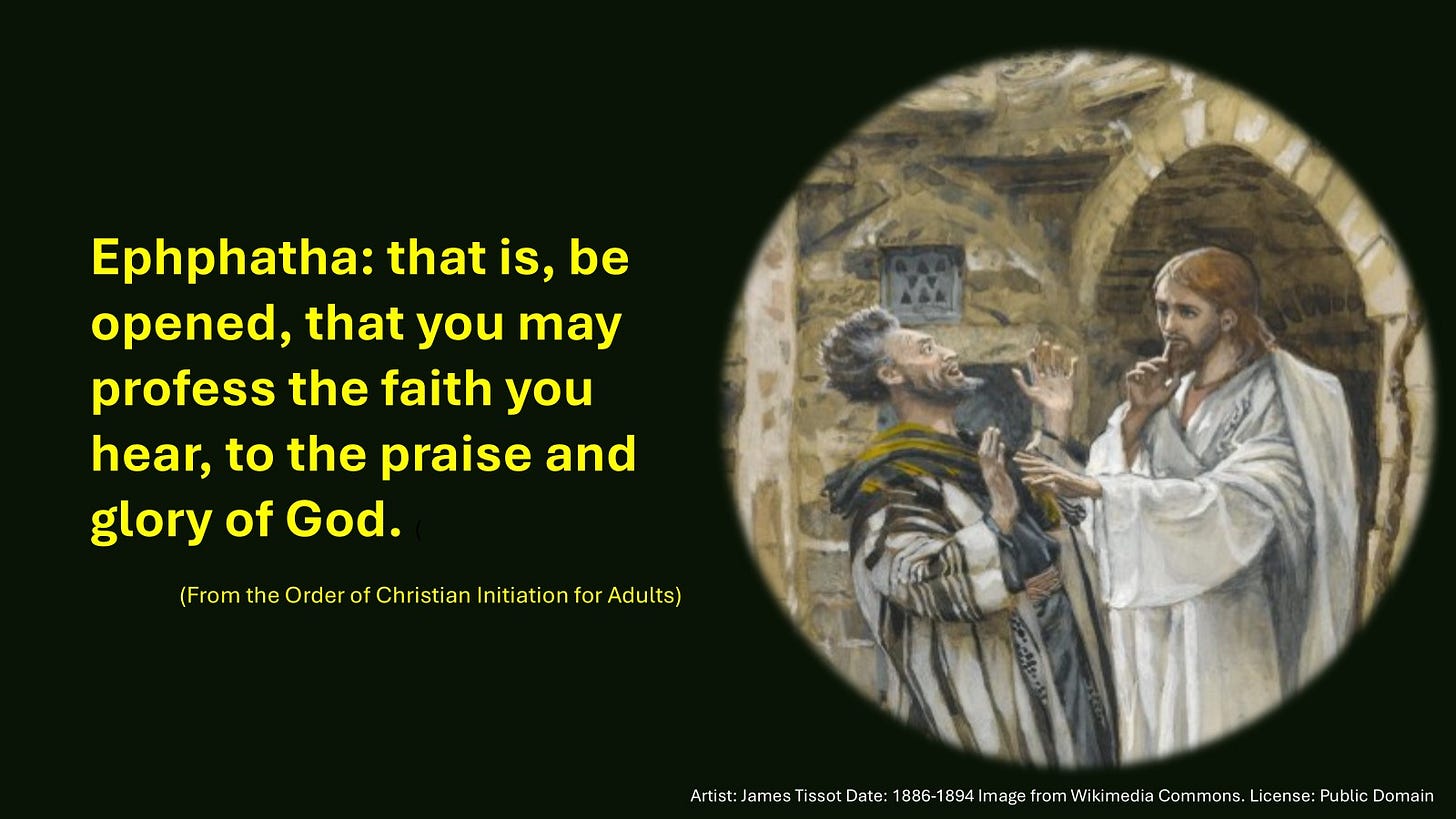Be Opened!
A Reflection on this Friday’s Gospel (Mark 7:31-37) – 14 February 2025
If God already knows everything, why do I need to pray? That is the question that a young woman asked me a few weeks ago. I immediately asked her if she prayed. She told me that she used to go to God several times a day with whatever problem she was having, or for some need she was experiencing. She told me that life was too hectic for a long “sit-down” with God. She then went down a long list of things that she prayed for. It sounded a lot like a very long “to do” list.
She told me that she stopped praying, feeling that God did not speak and if God is all-knowing, then what’s the point? She told me her whole spiritual world “has come crumbling down.” It had. Though she had stopped speaking, she never really listened. Her prayer was a monologue, not dialogue. She allowed herself to become spiritually deaf and then mute.
Thomas Merton, Trappist Monk and author was once asked; How do I improve my prayer life? His answer was, “Take the time.” Taking time with God is more than calling Him several times a day, giving Him a “to-do list” and then hanging up. An open line, or open door, implies a relationship which is both substantive and intentional.
Physical deafness insulates the deaf from the world around them. Spiritual deafness insulates us from God’s voice in our lives. Our prayer, if we pray at all, becomes like the person who talks constantly and never gives the other the opportunity to “break in” to the monologue. It is not a conversation. Like the prayer of the Pharisee in Luke 18:11, we are praying to ourselves.
Prayer is relationship. The fact that the Lord knows what we need before we ask does not mean that prayer has no value. Our prayer is less about what we say, and very much about how well we listen and contemplate. Prayer does not change God. Prayer changes us. For this, we must be open.
In today’s Gospel, Jesus takes a deaf man aside to heal him. In a moment of intimate self-communication akin to prayer, Jesus puts His finger into the man’s ears and, spitting, touches his tongue saying, Ephphatha, an Aramaic term meaning “be opened.” It comes from the Hebrew pâthach (פָּתַח) meaning to open wide, to loose, ungird, unstop, to throw open wide the door. It is used in the Hebrew Scriptures to describe the opening of the senses, eyes and ears, to prayer. (2 Chronicles 6:40, 7:11)
Before, the deaf man had been closed, isolated. It was very difficult for him to communicate. His recovery was an “openness," to others and the world. Like prayer, it was an openness that began with listening and culminated in speech.
As in all of Jesus’ miracles, it had a much wider effect than just healing the physical deafness of one man. In a greater way, all present were healed. The Lord’s command, “Ephphatha,” opened the spiritual ears and tongues of all present such that they could not help but openly proclaim the Good News;
“He has done all things well. He makes the deaf hear and the mute speak.” (Mark 7:37)
It is the same with us. We need to be opened from without. Christ became man so that man, inwardly deaf and mute through sin, would gain the ability to hear the voice of God and respond. Prayer is the voice of Love speaking to our heart removing any obstacles. Prayer is also growing in our ability to communicate in the language of love with God and others; substantially, intentionally. Prayer then becomes an expression of love. It is a true St Valentine’s Day communication.
This is why the gesture of '"Ephphatha" is included in the Rite of Baptism. We all need to be opened and, in that opening to God, become a conduit of grace into a world that is profoundly deaf.
In prayer, if we are open, we sustain a relationship through the Holy Spirit with God our Father, and with God the Son. It is a conversation that brings peace. Raising our soul to heaven, God gives us a view from above, an eternal perspective, as we navigate the twists and turns that take place in our lives. In prayer, we ask with the knowledge that the Lord is always present and will always act with love in our lives. We gain a disposition of hope. God changes us. That is the beauty of the command, Ephphatha.
Yes, God is omniscient, all knowing. Take comfort in His providential plan as we prayerfully ask for ourselves and intercede for others. Prayer is not a “to-do list” but a moment of grace. That is why taking the time to pray is so important. Prayer is God’s way of guiding us as a loving parent guides his children, if we hear, listen, and respond.
May we all prayerfully hear the Lord’s healing command; “Ephphatha, be open!”



I restacked the note but I wanted to give my thoughts here as well:
“Lord, teach us to pray.” Dcn. Mueller a wonderful reflection on the importance & necessity of prayer & allow prayer to change us.
It’s good to be reminded in this particular reflection that God changes us through prayer. 🙏🏻
The name escapes me, but I believe it was a Church Father, who likened that God pressed upon us like a seal on wax.
in the end, Thomas Merton was not a Catholic. He was not even a Christian. Great care must be taken in recommending any of his various heretical writings and quotes given where his convictions led him in the end. Frankly, Martin Luther was a more reliable source of genuine Catholic doctrine than Merton.